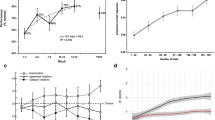Abstract
Two experiments investigated two complementary hypotheses: (a) The presence of semantically unimportant function words in sentences will not slow down the way subjects, unfamiliar with the language, extract the meaning of those sentences, provided suprasegmental cues are present, and conversely (b) the omission of such function words—as in native speakers' simplified speech to nonnative speakers—will not necessarily facilitate the task of meaning extraction, contrary to popular belief. In Experiment I, Dutch adult subjects were exposed to sentences in a miniature artificial language (MAL). In Experiment II, Greek adult subjects were exposed to sentences in an unfamiliar natural language (Dutch). In both experiments, the sentences contained eight words constituting a miniature linguistic system (mls), a system that subjects discovered through an audiovisual, concept-indentification task. The rate by which subjects performed this task was investigated as a function of two linguistic variables: (a) the presence or absence of semantically unimportant function words, and (b) the presence or absence of suprasegmental cues, in the input sentences, respectively. Results from both experiments confirmed the hypotheses (p<.001) The findings are discussed with reference to the linguistic versus cognitive simplicity issue, and to the comprehension versus production issue in language acquisition research. The methodological potential of the experimental paradigm for psycholinguistic research is also discussed.
Similar content being viewed by others
References
Chaudron, C. (1983). Simplification of input: Topic reinstatements and their effects on L2 learners' recognition and recall.TESOL Quarterly, 17, 437–458.
Clark, E.V., & Hecht, B.F. (1983). Comprehension, production, and language acquisition.Annual Review of Psychology, 34, 325–429.
Clark, H.H., & Clark, E.V. (1977).Psychology and language. New York: Harcourt Brace Jovanovich.
Clyne, M.G. (Ed.). (1981).International Journal of the Sociology of Language, 28 (Special issue on Foreigner Talk).
Cutler, A., & Fodor, J.A. (1979). Semantic focus and sentence comprehension.Cognition, 7, 49–59.
Cutler, A., & Foss, D.J. (1977). On the role of stress in sentence processing.Language and Speech, 22, 1–10.
Esper, E.A. (1925). A technique for the experimental investigation of associative interference in artificial linguistic material.Language Monographs, No. 1.
Ferguson, C.A. (1975). Towards a characterization of English foreigner talk.Anthropological Linguistics, 17, 1–14.
Foss, D.J. (1968a). An analysis of learning in a miniature linguistic system.Journal of Experimental Psychology, 76, 450–459.
Foss, D.J. (1968b). Learning and discovery in the acquistion of structured material: Effects of number of items and their sequence.Journal of Experimental Psychology, 77, 341–344.
Foss, D.J., & Hakes, D.T. (1978).Psycholinguistics: An introduction to the psychology of language. Englewood Cliffs, NJ: Prentice-Hall.
Gleitman, L.R., & Wanner, E. (1982). Language acquisition: The state of the state of the art. In E. Wanner & L.R. Gleitman (Eds.),Language acquisition: The state of the art. Cambridge: Cambridge University Press.
Hatch, E.M. (1983).Psycholinguistics: A second language approach. Rowley, MA: Newbury House.
Herriot, P. (1969). The comprehension of active and passive sentences as a function of pragmatic expectations.Journal of Verbal Learning and Verbal Behaviour, 8, 166–169.
Holmes, V., & Forster, K. (1972). Perceptual complexity and underlying sentence structure.Journal of Verbal Learning and Verbal Behaviour, 11, 148–156.
Kelch, K. (1985). Modified input as aid to comprehension.Studies in Second Language Acquisition.7, 81–90.
Klein, W. (1986).Second language acquisition. Cambridge: Cambridge University Press
Long, M.H. (1983). Linguistic and conversational adjustments to non-native speakers. In A. d'Anglejan (Ed.), Native speakers' reactions to approximative systems [Special issue].Studies in Second Language Acquisition, 5(2).
McCormack, W.C. (1984). Distinctive characteristics of foreigner talk. In J. den Haese & J. Nivette (Eds.),Proceedings of the Seventh World Congress of Applied Linguistics, Brussels, Belgium.
McNamara, J. (1982).Names for things: A study of human learning. Cambridge MA: M.I.T. Press.
Meisel, J.M. (1980). Linguistic simplification. In S.W. Felix (Ed.),Second language development: Trends and issues. Tübingen: Gunter Narr Verlag.
Miller, G.A., & Johnson-Laird, P.N. (1976).Language and perception. New York: Appleton-Century-Crofts.
Neisser, U. (1967).Cognitive psychology. New York: Appleton-Century-Crofts.
Schumann, J.H. (1982). Simplification, transfer and relexification as aspects of pidginization and early second language acquisition.Language Learning, 32, 337–366.
Shipley, E.F., Smith, C.S., & Gleitman, L.R. (1969). A study in the acquisition of language: Free responses to commands.Language, 45, 322–342.
Slobin, D.I. (1966). Grammatical transformations and sentence comprehension in childhood and adulthood.Journal of Verbal Learning and Verbal Behaviour, 5, 219–227.
Winitz, H., Sanders, R., & Kort, J. (1981). Comprehension of the [−∂z] plural allomorph.Journal of Psycholinguistic Research, 10, 259–271.
Author information
Authors and Affiliations
Additional information
This paper forms part of a doctorate research project concerned with the comprehensibility of foreigner talk, and was supported by the Foundation for Linguistic Research, which is funded by the Netherlands Organization for Scientific Research, NWO.
Rights and permissions
About this article
Cite this article
Issidorides, D.C. The discovery of a miniature linguistic system: Function words and comprehension of an unfamiliar language. J Psycholinguist Res 17, 317–339 (1988). https://doi.org/10.1007/BF01067200
Accepted:
Issue Date:
DOI: https://doi.org/10.1007/BF01067200




